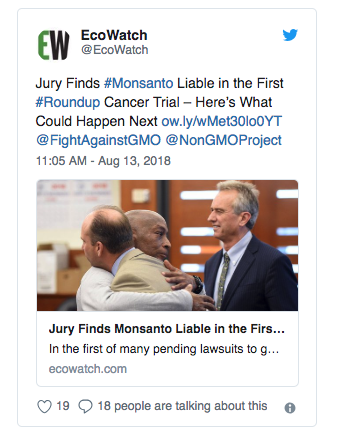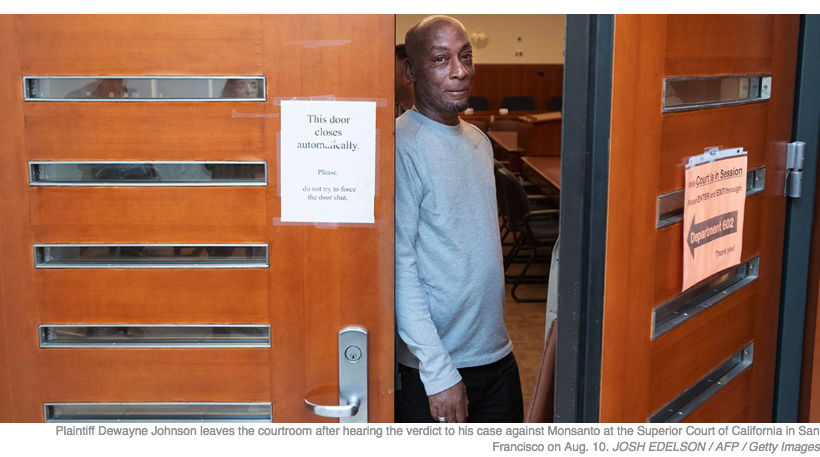Glyphosate the world’s most popular herbicide, is at the center of international scrutiny after a San Francisco court on Friday decided in favor of a California school groundskeeper with terminal cancer.
The jury ruled that the plaintiff, Dewayne “Lee” Johnson, developed cancer from repeated exposure to Roundup, Monsanto‘s widely used glyphosate-based weedkiller, and ordered the company to pay $289 million in damages.
The landmark jury ruling, which could open the door for roughly 4,000 similar U.S. lawsuits against Monsanto, sparked outcry around the world.
Europe
Germany’s Bayer, which purchased Monsanto this year for $63 billion, also purchased a potential mountain of legal costs. Shareholders are certainly spooked. Bayer’s stock tumbled as much as 14 percent on Monday, losing about 12 billion euros ($14 billion) in market value, Reuters reported.
Bayer defended the safety of glyphosate and said it would appeal the verdict. “The jury’s verdict is at odds with the weight of scientific evidence, decades of real world experience and the conclusions of regulators around the world that all confirm glyphosate is safe and does not cause non-Hodgkin’s lymphoma,” the company said in a statement to Reuters.
Glyphosate, the most-used herbicide in the European Union, has been the subject of fierce debate in Europe for years. Last year, the European Commission extended its license for five years, but the ruling in San Francisco has reinvigorated calls for a ban.
“We must fight the invasion of this substance in our market, a threat that exists due to monstrous commercial agreements signed only in the name of profit,” Italy’s Deputy Prime Minister Luigi Di Maio wrote on Facebookover the weekend.
France’s Environment Minister Nicolas Hulot described the verdict as the “beginning of a war” against glyphosate in Europe. “If we wait, such poisons will not be prevented from doing their damage and the victims will be excessively numerous,” he said to BFM radio.
Italy and France are moving towards a phase-out of the chemical. Germany aims to end use of glyphosate in this legislative period, which ends in three years, Reuters reported. In April, German Agriculture Minister Julia Kloeckner announced she was drafting rules to stop use of glyphosate in the country’s home gardens, parks and sports facilities.
India
Activists told Times of India on Monday that Friday’s verdict in California should prompt a nationwide ban.
“Our organization has already filed a petition with the ministry of agriculture with thousands of signatures seeking the ban on glyphosate. However the government has not taken any action so far,” Kathiva Kuruganti of Alliance for Sustainable and Holistic Agriculture told the publication.
Glyphosate is widely used on herbicide-tolerant cotton in India. In May, India’s Supreme Court refused to stay the Delhi High Court’s ruling that Monsanto cannot claim patents for Bollgard and Bollgard II, its genetically modified cotton seeds, in the country. Monsanto first introduced its GM-technology in India in 1995. Today, more than 90 percent of the country’s cotton crop is genetically modified.
Australia
On the heels of the ruling in California, Greenpeace is urging the Australian government to restrict sales of Monsanto’s weedkillers, which is sold in shops across the country.
“Use of this dangerous product should be severely restricted,” Jamie Hanson, Greenpeace’s head of campaigns, told Guardian Australia.”
Hanson added, “Roundup is widely available for sale in Australia … potentially exposing millions of people to its harmful effects. This case is only the first of hundreds that have been filed in the U.S. claiming Roundup causes non-Hodgkin lymphoma. We have no idea how far this will spread and how many more are to come.”
Shares of Australia’s Nufarm, which contains glyphosate, fell 17 percent Monday after the cancer finding in California, Reuters reported.
“The U.S. Environmental Protection Agency and regulatory authorities around the world, including Australia, support the fact that glyphosate does not cause cancer,” spokeswoman for Monsanto in Australia told Guardian Australia.

Read the article here.. www.ecowatch.org

